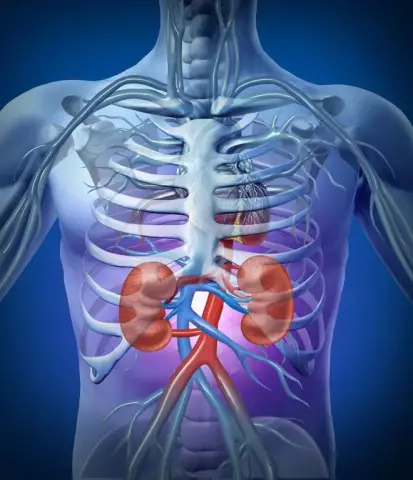- Author Rachel Wainwright wainwright@abchealthonline.com.
- Public 2023-12-15 07:39.
- Last modified 2025-11-02 20:14.
Acute renal failure
Brief description of the disease

Acute renal failure is understood as a sharp cessation or sudden decrease in the performance of both kidneys (or the only one in the case of people who have already had one kidney removed). At the same time, the organs can no longer perform the filtration, excretory and secretory functions assigned to them. This is precisely what acute renal failure is dangerous. Treatment of the disease depends on the reasons for which it was caused, concomitant diseases and a number of other important factors.
Acute renal failure - causes of the disease
- trauma, sepsis, severe burns, allergic shock and other phenomena that lead to prolonged bleeding and insufficient blood supply to the renal tissue. A similar result is also observed with a large loss of water and uncontrolled use of diuretics;
- toxic effects, side effects of certain drugs, kidney disease (acute glomerulonephritis, arterial hypertension, rheumatic lesions);
- blockage of the urinary tract or squeezing them during a tumor process. In this case, a person first develops a slight edema, which grows over time and leads to necrosis of the renal tissue.
Acute renal failure - symptoms of the disease
- a decrease in the amount of urine (oliguria) or its complete absence (anuria);
- general deterioration in the patient's well-being;
- nausea, vomiting, diarrhea;
- lack of appetite;
- enlarged liver and swelling of the limbs;
- inhibited reaction of the patient to habitual actions and stimuli. Sometimes apparent apathy is replaced by excitement.
Acute renal failure causes the kidneys to stop working to maintain the electrolyte balance of the blood. As a result, blood vessels begin to circulate protein metabolism products - creatinine and urea - throughout the body. At the same time, the secretory functions of the kidneys are disrupted, and the number of red blood cells decreases. Acute renal failure, which was not treated or was carried out in violation of generally accepted principles, leads to serious complications and disruptions in the work of all major body systems.
Acute renal failure - treatment and prognosis

In the early stages of the disease, it is necessary to take measures to eliminate the causes of acute renal failure, which may include both various diseases and all kinds of pathological processes. In case of large blood loss, doctors use special blood substitutes. In this case, it is necessary to remove toxins from the body as soon as possible. For this purpose, the patient is prescribed gastric lavage and antidotes, for example, unithiol, the main task of which is to bind poisons and prevent their further spread throughout the human body. For blood purification, modern medical equipment is used, in particular, plasmapheresis. If the patient has a blockage of the urinary tract, it is necessary to restore their patency or perform a puncture to drain the accumulated urine.
With regard to the direct treatment of acute renal failure. Osmotic diuretics (sorbitol, mannitol) are most commonly used today. They are especially effective in the early stages of the disease. At the same time, doctors monitor the water balance, the amount of electrolytes and urea in the blood. The patient is prescribed a strict diet, anabolic hormones and vitamin E. In the absence of positive dynamics, the specialists of the medical institution are considering the use of hemodialysis.
Treatment projections depend on the dynamics of the disease. As a rule, after the rendered medical care, the kidneys restore their working capacity within a period of 6 months to 2 years.
Acute renal failure in children
In children, the disease manifests itself with the same symptoms as in adults. Conditionally, the course of the disease can be divided into three stages:
- at the first stage, general symptoms prevail, repeating the symptoms of the disease or poison, due to which the insufficiency arose;
- a sharp decrease or complete absence of diuresis (urination), vomiting, stomach pain, unstable stool;
- gradual restoration of diuresis against the background of increased water consumption and disturbances in the electrolyte balance of the blood.
It is necessary to start treating the disease immediately after an accurate diagnosis has been made. First of all, it is necessary to eliminate the cause that caused acute renal failure in children. At the same time, adequate renal blood flow is also maintained, plasma transfusion is performed, and vasodilators are taken, if, of course, they are allowed by the attending physician. Like adults, children must follow a strict carbohydrate diet. The choice of medication is somewhat difficult due to the numerous contraindications, so we will not dwell on this point in detail, leaving the decision on the appointment of specific medications to the staff of a specialized medical institution.
YouTube video related to the article:
The information is generalized and provided for informational purposes only. At the first sign of illness, see your doctor. Self-medication is hazardous to health!






